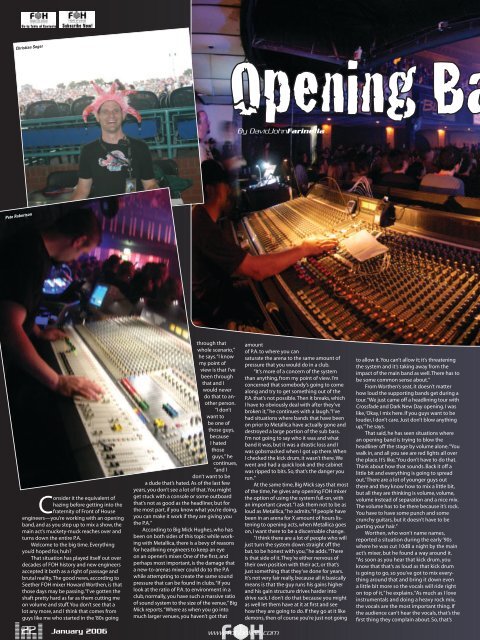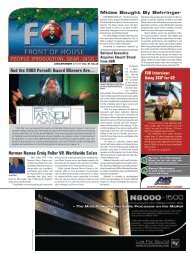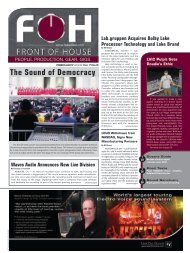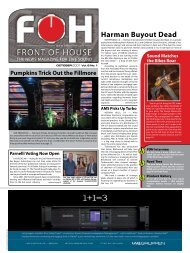You also want an ePaper? Increase the reach of your titles
YUMPU automatically turns print PDFs into web optimized ePapers that Google loves.
Chr<strong>is</strong>tian Seger<br />
Pete Robertson<br />
Consider it the equivalent of<br />
hazing before getting into the<br />
fraternity of Front of House<br />
engineers—you’re working with an opening<br />
band, and as you step up to mix a show, the<br />
main act’s muckety-muck reaches over and<br />
turns down the entire P.A.<br />
Welcome to the big time. Everything<br />
you’d hoped for, huh?<br />
That situation has played itself out over<br />
decades of <strong>FOH</strong> h<strong>is</strong>tory and new engineers<br />
accepted it both as a right of passage and<br />
brutal reality. The good news, according to<br />
Seether <strong>FOH</strong> mixer Howard Worthen, <strong>is</strong> that<br />
those days may be passing. “I’ve gotten the<br />
shaft pretty hard as far as them cutting me<br />
on volume and stuff. You don’t see that a<br />
lot any more, and I think that comes from<br />
guys like me who started in the ‘80s going<br />
through that<br />
whole scenario,”<br />
he says. “I know<br />
my point of<br />
view <strong>is</strong> that I’ve<br />
been through<br />
that and I<br />
would never<br />
do that to another<br />
person.<br />
“I don’t<br />
want to<br />
be one of<br />
those guys,<br />
because<br />
I hated<br />
those<br />
guys,” he<br />
continues,<br />
“and I<br />
don’t want to be<br />
a dude that’s hated. As of the last few<br />
years, you don’t see a lot of that. You might<br />
get stuck with a console or some outboard<br />
that’s not as good as the headliner, but for<br />
the most part, if you know what you’re doing,<br />
you can make it work if they are giving you<br />
the P.A.”<br />
According to Big Mick Hughes, who has<br />
been on both sides of th<strong>is</strong> topic while working<br />
with Metallica, there <strong>is</strong> a bevy of reasons<br />
for headlining engineers to keep an eye<br />
on an opener’s mixer. One of the first, and<br />
perhaps most important, <strong>is</strong> the damage that<br />
a new-to-arenas mixer could do to the P.A<br />
while attempting to create the same sound<br />
pressure that can be found in clubs. “If you<br />
look at the ratio of P.A. to environment in a<br />
club, normally, you have such a massive ratio<br />
of sound system to the size of the venue,” Big<br />
Mick reports. “Where as when you go into<br />
much larger venues, you haven’t got that<br />
22 January 2006 www.fohonline.com<br />
Opening Ba<br />
By DavidJohnFarinella<br />
amount<br />
of P.A. to where you can<br />
saturate the arena to the same amount of<br />
pressure that you would do in a club.<br />
“It’s more of a concern of the system<br />
than anything, from my point of view. I’m<br />
concerned that somebody’s going to come<br />
along and try to get something out of the<br />
P.A. that’s not possible. Then it breaks, which<br />
I have to obviously deal with after they’ve<br />
broken it,” he continues with a laugh. “I’ve<br />
had situations where bands that have been<br />
on prior to Metallica have actually gone and<br />
destroyed a large portion of the sub bass.<br />
I’m not going to say who it was and what<br />
band it was, but it was a drastic loss and I<br />
was gobsmacked when I got up there. When<br />
I checked the kick drum, it wasn’t there. We<br />
went and had a quick look and the cabinet<br />
was ripped to bits. So, that’s the danger you<br />
run.”<br />
At the same time, Big Mick says that most<br />
of the time, he gives any opening <strong>FOH</strong> mixer<br />
the option of using the system full-on, with<br />
an important caveat. “I ask them not to be as<br />
loud as Metallica,” he admits. “If people have<br />
been in an arena for X amount of hours l<strong>is</strong>tening<br />
to opening acts, when Metallica goes<br />
on, I want there to be a d<strong>is</strong>cernable change.<br />
“I think there are a lot of people who will<br />
just turn the system down straight off the<br />
bat, to be honest with you,” he adds. “There<br />
<strong>is</strong> that side of it. They’re either nervous of<br />
their own position with their act, or that’s<br />
just something that they’ve done for years.<br />
It’s not very fair really, because all it basically<br />
means <strong>is</strong> that the guy runs h<strong>is</strong> gains higher<br />
and h<strong>is</strong> gain structure drives harder into<br />
drive rack. I don’t do that because you might<br />
as well let them have at it at first and see<br />
how they are going to do. If they go at it like<br />
demons, then of course you’re just not going<br />
to allow it. You can’t allow it; it’s threatening<br />
the system and it’s taking away from the<br />
impact of the main band as well. There has to<br />
be some common sense about.”<br />
From Worthen’s seat, it doesn’t matter<br />
how loud the supporting bands get during a<br />
tour. “We just came off a headlining tour with<br />
Crossfade and Dark New Day opening. I was<br />
like, ‘Okay, I mix here. If you guys want to be<br />
louder, I don’t care. Just don’t blow anything<br />
up,’” he says.<br />
That said, he has seen situations where<br />
an opening band <strong>is</strong> trying to blow the<br />
headliner off the stage by volume alone. “You<br />
walk in, and all you see are red lights all over<br />
the place. It’s like, ‘You don’t have to do that.<br />
Think about how that sounds. Back it off a<br />
little bit and everything <strong>is</strong> going to spread<br />
out.’ There are a lot of younger guys out<br />
there and they know how to mix a little bit,<br />
but all they are thinking <strong>is</strong> volume, volume,<br />
volume instead of separation and a nice mix.<br />
The volume has to be there because it’s rock.<br />
You have to have some punch and some<br />
crunchy guitars, but it doesn’t have to be<br />
parting your hair.”<br />
Worthen, who won’t name names,<br />
reported a situation during the early ‘90s<br />
where he was cut 10dB a night by the main<br />
act’s mixer, but he found a way around it.<br />
“As soon as you hear that kick drum, you<br />
know that that’s as loud as that kick drum<br />
<strong>is</strong> going to go, so you’ve got to mix everything<br />
around that and bring it down even<br />
a little bit more so the vocals will ride right<br />
on top of it,” he explains. “As much as I love<br />
instrumentals and doing a heavy rock mix,<br />
the vocals are the most important thing. If<br />
the audience can’t hear the vocals, that’s the<br />
first thing they complain about. So, that’s

















